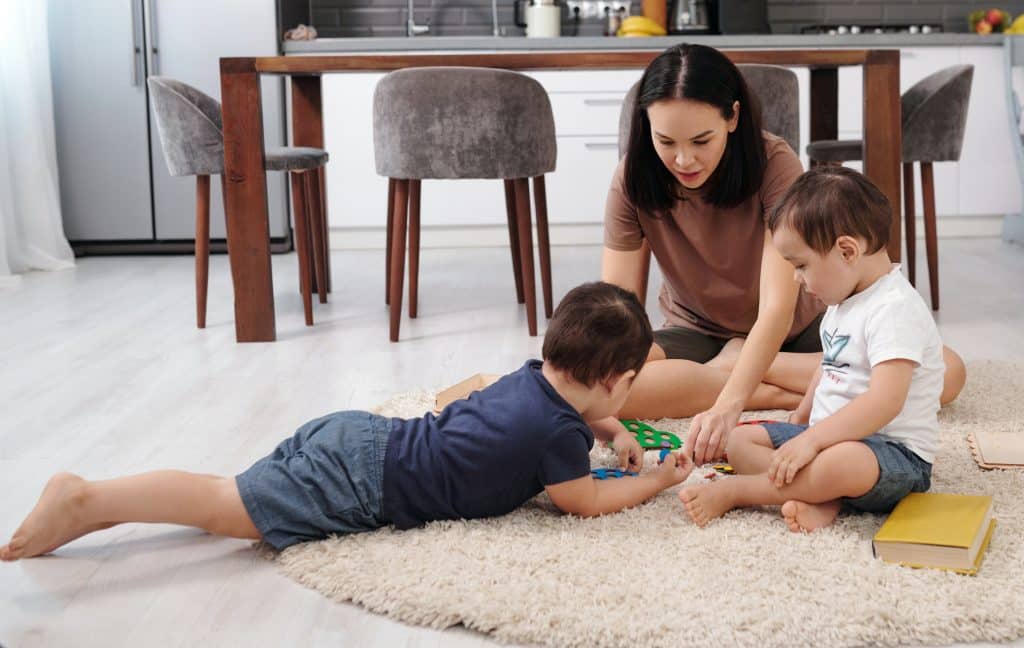Choosing a therapist and BCBA for your child is essentially inviting someone into your family. Therapists are going to be there for the good and the bad. They will be there when your child accomplishes the small goals – goals that you have been working on for over 6 months. They will be there for the milestone birthdays, their first day of school. When you choose a therapist, they will be there for it all, so you want to make sure you know what you are looking for when it comes to that time.
Table of Contents
SPONSORED BY: Goally
Goally’s Kid’s Tablet has one of the largest libraries of skill-building videos (like “How to Share” and “What To Do When You’re Lost”) in the Goal Mine app.👇
I think it is important to know what the role of a therapist/technician is. In ABA (Applied Behavior Analysis) you will have a BCBA; they are a masters-level clinician that has also passed a board exam to certify them to practice behavioral analysis. Then you will have a therapist.
These people are the ones that will be providing therapy 1:1 with your child. They receive the plans, protocols, interventions from the BCBA, and implement them during the therapy session. So, when it comes down to choosing a therapist, or maybe simply knowing that you have a good therapist (if you don’t get to choose) comes down to a few things.
Things To Consider When Choosing Your BCBA & Therapist
Experience
Though experience is important, it is good to keep in mind that it is not the most important. As a BCBA, I have been with new therapists that are enthusiastic, bright, and accept feedback graciously and implement it correctly. But, of course, with any job, having experience really helps when situations arise that you are unfamiliar with. Experience is something that will help navigate therapy sessions smoothly or be able to give sound advice.
One last tidbit about experience: make sure when you ask about their experience, you keep in mind all relevant experience with children in general. Having experience in the field is helpful but, having experience with children that have ASD is something that I would be looking for.

Read more: What is ABA therapy?
Personality
When you are looking for a therapist, make sure you are looking for a personality that not only your child will get along with, but you as well. It’s important to find someone that is enthusiastic, engaging, and able to remain positive and take direction. Observation is something that I would ask for early on in their therapy. As a parent or guardian, you want to see them engaging your child in play and work, sitting on the floor with them, and providing naturalistic teaching opportunities and a positive atmosphere. What I often tell parents is that ABA shouldn’t look boring or like work, it should be a fun environment where your child is learning.
Consistency
Consistency is super important when it comes to achieving progress in anything. And finding a therapist who is consistent with their methods, attendance, and interactions with you and your child is key. Especially if the therapist is using ABA, or if you as a parent are implementing programs like Goally. It’s really important to know that your therapist is sticking to the programs, protocols, and feedback that you’ve given them, as this will help ensure the success of ABA overall. So when you’re looking for a therapist, make sure to prioritize consistency!
ABA and BCBA Therapy Styles
Each therapist has a different style and approach to how they implement a therapy session. This is important to keep in mind when you are observing your therapist in their session. The structure of the therapy should be the same across the board. These include the programs and their implementation, what behaviors they should be targeting, and if they are using any devices (such as Goally), their implementation should be the same. Once you determine the style that works best for you and your family, this will help with the outcome of ABA and the programs within ABA.
Go With Your Gut!
When in doubt go with your gut. I have had plenty of parents say to me, “she is really nice, but I don’t think she’s the right fit for our family.” That is ok because at the end of the day, it’s your child and your family. And if you think it’s not a good fit, then it’s not a good fit. If you are working with a quality provider or company, they will be open to the feedback and will place a different therapist with your child.
These tips on how to choose the right therapist also align with how to choose the right BCBA. Here are some additional, comprehensive questions you can write down or print when you are looking to pick the right BCBA.

Read more: How To Prevent BCBA Burnout
Supervision Received by a BCBA
The Behavior Analyst Certification Board recommends that the BCBA be involved and present. In practice, your BCBA should see your child and their therapist at least once per week. This is to help ensure that the programs and protocols are being run appropriately and are updated when needed.
Individualized Goal Prioritization
Goals should be determined and prioritized based on the assessment completed by the BCBA and family input. The order in prioritizing goals will be unique to each child but should be a topic of discussion with your BCBA. Ideally, they should increase independence for the child and promote less prompting from the parents. Using a device like Goally will assist with the independence of task completion and your child.
Constant Monitoring of BCBA Goals
A BCBA should collect data on each goal and review at least every 2 weeks. This could be on your Goally device – data that was collected by a therapist in your session. This data will determine if adequate progress is being made or if therapy should be changed to ensure the child makes meaningful progress as quickly as possible.
Caregiver Involvement
ABA should involve and teach parents strategies to manage problem behavior and teach skills to their child. The BCBA will set up parent training and provide different ways to help the parents with the overall success of ABA. They will also provide assistance with any strategies or other ways the parents may be facilitating independence at home.
Overall, therapy should be naturalistic and FUN! Your therapist should focus on teaching your child how to access more meaningful, motivating, and fun interactions while working within naturalistic contexts (e.g. play, community, with peers, etc.)
FAQs About BCBA
What is a BCBA? A Board Certified Behavior Analyst (BCBA) is a professional who has received specialized training in behavior analysis and is certified by the Behavior Analyst Certification Board. What does a BCBA do? A BCBA is responsible for designing, implementing, and monitoring behavior analysis programs for individuals with autism or other developmental disabilities. They also work with families and caregivers to teach them how to apply behavior analysis principles to everyday situations. How do you become a BCBA? To become a BCBA, you must have a master's degree in behavior analysis or a related field, complete supervised experience in behavior analysis, and pass a certification exam administered by the Behavior Analyst Certification Board. What are the benefits of working with a BCBA? Working with a BCBA can provide numerous benefits, such as developing new skills and behaviors, improving communication and socialization, and reducing challenging behaviors. How can a BCBA help my child with special needs? A BCBA can develop an individualized behavior analysis program for your child, which can help them learn new skills, reduce challenging behaviors, and improve their overall quality of life.
This post was originally published on 12/28/2020. It was updated on 07/11/2023.
____________________________________________________
Erin Donahue resides in the mitten state (Michigan!) along with her dog and husband. She has been a BCBA for 3 years and in the field of ABA for going on 6 years. She loves advocating, educating, and helping this wonderful community.
Editor’s note: This information is not meant to diagnose or treat and should not take the place of personal consultation, as needed, with a qualified healthcare provider and/or BCBA.

Goally
We help parents teach their kids life skills, like doing bedtime and morning independently. Backed by science, we incorporate evidence-based practices and expert-informed designs in all of our apps and content.







